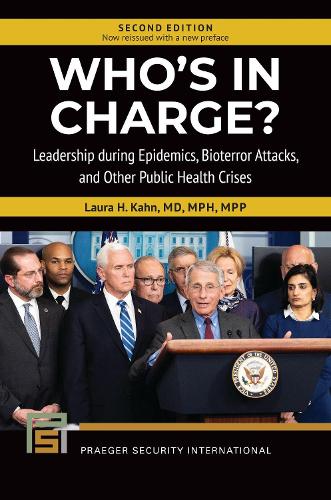
Who's in Charge: Leadership during Epidemics, Bioterror Attacks, and Other Public Health Crises
(Paperback, 2nd edition)
Available Formats
Publishing Details
Who's in Charge: Leadership during Epidemics, Bioterror Attacks, and Other Public Health Crises
By (Author) Laura H. Kahn
Bloomsbury Publishing PLC
Praeger Publishers Inc
16th April 2020
2nd edition
United States
Classifications
Tertiary Education
Non Fiction
362.1
Physical Properties
Paperback
266
Width 156mm, Height 235mm
Description
With a new preface assessing leadership responses to the coronavirus pandemic, this text explores leadership problems that can develop during such public health crises as the 2001 anthrax attacks, 2003 SARS epidemic, and Mad Cow Disease epidemic of the 1980s1990s. A threat to public health, such as a rampaging virus, is no time for a muddled chain of command and contradictory decision-making. Who's In Charge Leadership during Epidemics, Bioterror Attacks, and Other Public Health Crises, re-issued with a new preface assessing leadership during the COVID-19 outbreak, explores the crucial relationships among political leaders, public health officials, and journalists to see why leadership confusion develops. As the problematic response to COVID-19 has once again shown, the reluctance of politicians to risk alarm can run counter to the public health need to prepare for worse cases. Many leaders will seek high visibility during a public health crisis, but politicians are not medical experts, and the more they speak, the more they risk disseminating harmful information. How to achieve the right balance is the essence of this book. Beginning by looking at the overarching issues of leadership and public health administration, it then examines in depth five emergencies: the 2001 anthrax attacks, the 1993 cryptosporidium outbreaks, the 2003 SARS outbreak, the 2001 foot-and-mouth disease crisis, and the battle against Mad Cow Disease.
Reviews
""Who's in Charge Leadership During Epidemics, Bioterror Attacks, and Other Public Health Crises" is a well researched and easily readable book that offers valuable insight into many leadership challenges that politicians, health authorities, and medical scientists faced when dealing with some large and widely publicized health crises. This text is a valuable contribution." -
JAVMA
""Who's in Charge" is written in an easy, informal style that can be understood by readers with minimal knowledge about medicine and public health .the content is strong, and the result is a useful, thought-provoking book and valuable resource for public officials. The volume also raises a number of important policy issues that warrant attention and action or at least serious reflection by those likely to be in charge the next time disaster comes calling." -
Health Affairs
"A perfect text for schools in public health, or as a reference for elected officials at every level of government, the book shows how each event developed step-by-step to pinpoint specific leadership issues. Engaging and absorbing, the work presents official reports, medical literature, first-person accounts from officials and journalists, and discussions of the role of law enforcement and the military during health care emergencies." -
Veterinaria Italiana
"Kahn's examples of the generalities between the political and bureaucratic gravity fields in government is expanded in the first few chapters into an excellent framework of historical facts and lessons learned. . . . If you want to better understand the 'how' and 'why' behind the United States' health care responses to H1N1 Influenza Outbreak and the Haitian earthquake disaster, read this book!" -
Journal of Homeland Security and Emergency Management
"The book can be used as a supplemental text for courses in public health, or as a reference for elected officials at every level." -
SciTech Book News
"This well-written, thoroughly researched, and authoritative book will interest public health and medical professionals and public policy students, along with the general public. Recommended. Lower-level undergraduates and above; general readers." -
Choice
Author Bio
Laura H. Kahn, MD, MPH, MPP is a physician and research scholar in the Program on Science and Global Security at the Woodrow Wilson School of Public and International Affairs at Princeton University.
